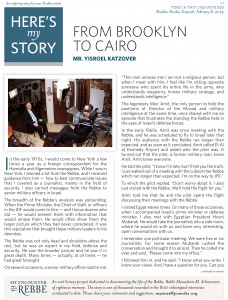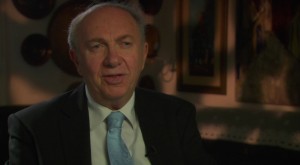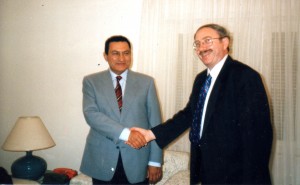HMS: From Brooklyn to Cairo
In the early 1970s I would come to New York a few times a year, as a foreign correspondent for Hamodia and the Algemeiner newspapers. While I was in New York, I learned a lot from the Rebbe, and I received guidance from him – how to best communicate issues that I covered as a journalist, mainly in the field of security. I also carried messages from the Rebbe to senior military officers in Israel.
The breadth of the Rebbe’s analysis was astounding. When the Prime Minister, the Chief of Staff, or officers in the IDF would come to him – and I know dozens who did – he would present them with information that would amaze them. He would often show them the larger picture which they had never considered. It was this reputation that brought these military leaders to his doorstep.
The Rebbe was not only head and shoulders above the rest, but he was an expert in my field, defense and security. He saw the broader picture and he saw it in great depth. Many times – actually, at all times – he had great foresight.
On several occasions, a senior military officer said to me: “This man amazes me! I am not a religious person, but when I meet with him, I feel like I’m sitting opposite someone who spent his entire life in the army, who understands weaponry, knows military strategy, and understands intelligence.”
The legendary Meir Amit, the only person to hold the positions of Director of the Mosad and military intelligence at the same time, once shared with me an episode that illustrates the standing the Rebbe held in the eyes of Israel’s defense forces:
In the early 1960s, Amit was once meeting with the Rebbe, and he was scheduled to fly to Israel later that night. His audience with the Rebbe ran longer than expected, and as soon as it concluded, Amit called El Al at Kennedy Airport and asked who the pilot was. It turned out that the pilot, a former military man, knew Amit. Amit knew everyone.
He told the pilot, “I know I’m late, but I’ll tell you the truth. I just walked out of a meeting with the Lubavitcher Rebbe which ran longer than expected. I’m on the way to JFK.”
To which the pilot replied, “Don’t worry about it. I also just visited with the Rebbe. We’ll hold the flight for you.”
Amit told me that he and the pilot spent the flight discussing their meetings with the Rebbe.
I visited Egypt eleven times. On many of those occasions, when I accompanied Israel’s prime minister or defense minister, I also met with Egyptian President Hosni Mubarak. He would take the journalists into a side room, where he would sit with us and have very interesting, open conversations with us.
I remember one particular meeting. We were five or six journalists. For some reason Mubarak rushed the conversation and brought it to an end. Then he called me over and said, “Please come into my office.”
I followed him in, and he said: “I know what you write. I know your views. And I have a question for you. Can you tell me what the Lubavitcher Rebbe wants from me?”
I was shocked. I said to him, “To what is the President referring?”
He said, “The Rebbe speaks out against our agreements with Israel. He sees us as an ongoing threat. Why does he do this? What does he have against me?”
I responded: “I am certain that the next time the President will visit the United States the Rebbe will be happy to meet with you and explain his views to you. I can only present my understanding…” And for a half an hour, he listened as I told him about the Rebbe – who the Rebbe was, what his approach was, what was the history of Chabad, about their work all over the world.
In my opinion, it made an impression on him. I saw confirmation of this many years later.
In 1984 the Rebbe launched a campaign for all Jews to study Maimonides’ Code of Jewish Law. In 1985, when it came time to celebrate the completion of the first study cycle, the organizers of the event in Israel decided to hold the ceremony in Maimonides’ old synagogue in Cairo.
They were concerned that, in light of the Rebbe’s statements concerning Egypt, permission would not be granted. So I was asked to help.
I spoke with the Egyptian Ambassador to Israel and I said, “The Chabad chasidim want to arrange an event in Cairo.” I explained that they wanted to celebrate the study of Maimonides’ book. That there was nothing political about it, only scholarship.
The Ambassador agreed to pass on my request.
I said to him, “I don’t know who you plan to talk to, but I request
that you bring this matter all the way to the top. I have no doubt that your President will authorize it.”
He promised to do so.
To this day I don’t know if he actually did bring it to Mubarak, but it didn’t take long to receive a response. Two days later, he came back and said, “I went to the top. There’s no problem for Chabad to come and hold the event in Cairo.”
The ceremony took place, and the Egyptians treated the chasidim very well.
This just goes to show that, even in Egypt, the Rebbe’s standing was strong, and that they took his opinion into account. The same applied for other Arab countries, and many other places in the world.
Yisroel Katzover is a senior Israeli journalist who covered the Israel Defense Forces and Israeli security issues for several decades for Hamodia, the Algemeiner, Kol Yisrael, and other media outlets. He was interviewed at his home in Jerusalem in March of 2010. His interview was featured in Faithful and Fortified, Volume II: Israel’s Journalists.
Dedicated








No Comments to “HMS: From Brooklyn to Cairo”